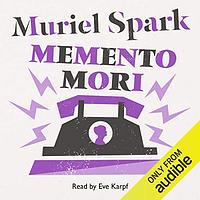Take a photo of a barcode or cover
Apparently, there is only an audible edition of this book on Goodreads, hence my selection but I had READ (eyes to paper read) the book. I had picked up Parable of the Sower by Octavia Butler, and even though I thought both the book and author were brilliant, I could not finish it and it caused a reading slump. It is somewhat ironic that I enjoy mysteries and horror stories and yet the Parable of the Sower, even though written at least two decades ago, seemed to illustrate the horribleness of humanity so realistically, I was heartbroken and despondent. Why am I talking about one book, when I should be commenting on another? In Memento Mori, even though not a positive, optimistic story Muriel Spark does, cruelly, invoke laughter at the foolish, base behaviour of a group of elderly acquaintances. And most unfortunately, in her opinion, we do not get wiser, kinder or better in any way as we age. I definitely think the book is a must read and will look for other titles.
Even though at the start this book made me just sleepy (lack of sleep didn't help - it never does) - I ended up really enjoying it!
It felt like a cosy read mixed with surprising turns, sometimes odly funny and dark. I could really imagine all these elderly people comparing themselves to each other, making big deals out of their will - and just showing human characteristics, some more sympathetic than others.
I'm definitely planning to read more Muriel Spark! :)
It felt like a cosy read mixed with surprising turns, sometimes odly funny and dark. I could really imagine all these elderly people comparing themselves to each other, making big deals out of their will - and just showing human characteristics, some more sympathetic than others.
I'm definitely planning to read more Muriel Spark! :)
Sharp and funny and compassionate and just what the title says. The characters are great and the dialogue and interactions are so true.
One of the best parts of the book:
One of the best parts of the book:
"You know, Taylor," said Dame Lettie, "I do not feel I can continue to visit you. These creatures are too disturbing, and now that I am not getting my proper sleep my nerves are not up to these decrepit women here. One wonders, really, what is the purpose of keeping them alive at the country's expense."
"For my part," said Miss Taylor, "I would be glad to be let die in peace. But the doctors would be horrified to hear me say it. They are so proud of their new drugs and new methods of treatment -- there is always something new. I sometimes fear, at the present rate of discovery, I shall never die."
Dame Lettie considered this statement, uncertain whether it was frivolous or not. She shifted bulkily in her chair and considered the statement with a frown and a downward droop of her facial folds.
Miss Taylor supplied obligingly: "Of course the principle of keeping people alive is always a good one."
A strange, entertaining, silly book with lots of twists and turns.
dark
funny
medium-paced
Plot or Character Driven:
Plot
Strong character development:
Yes
Loveable characters:
Yes
Diverse cast of characters:
No
Flaws of characters a main focus:
Yes
The voice on the telephone won't stop reminding Dame Lettie Colston that she must die. The police won't take her seriously and even her brother doesn't believe her until he starts receiving calls himself. 'Memento Mori' primarily involves two groups of elderly people: Dame Lettie's set, and the residents of a ward in the state nursing home her sister-in-law's maid retired to. As the novel goes on, more and more of their acquaintances receive these phone calls and there appears to be nothing they can do to stop them.
Spark's characters, whether they are those resigned to wait in their hospital beds or carrying on in London are preoccupied with managing their estates, comparing each others ailments, and scheming for the future. Each of them take the phone calls differently, but the majority of them react with anger and disbelief: the cheek! who would dare? No one wants to accept the fact of their mortality. They are dealing with crippling illness and blows against their dignity, they want power or money or a glimpse of garter. Spark makes her humor by pointing out the ridiculousness of "everyday" pursuits. Memento Mori strides into this potential quagmire effortlessly and Spark never betrays any sentiment in the treatment of her characters.
I should have known from having read Spark before, but this novel was a lot of fun to read - death and all - and no description of mine can do it justice.
Spark's characters, whether they are those resigned to wait in their hospital beds or carrying on in London are preoccupied with managing their estates, comparing each others ailments, and scheming for the future. Each of them take the phone calls differently, but the majority of them react with anger and disbelief: the cheek! who would dare? No one wants to accept the fact of their mortality. They are dealing with crippling illness and blows against their dignity, they want power or money or a glimpse of garter. Spark makes her humor by pointing out the ridiculousness of "everyday" pursuits. Memento Mori strides into this potential quagmire effortlessly and Spark never betrays any sentiment in the treatment of her characters.
I should have known from having read Spark before, but this novel was a lot of fun to read - death and all - and no description of mine can do it justice.
My first Muriel Spark book and an absolute delight from start to finish.
While I was not fond of The Prime of Miss Jean Brodie, several people recommended I read another Murial Spark book and the most recommended was Memento Mori. For which I'm grateful, because I enjoyed it quite a bit.
The story revolves around a group of the elder, each of whom exists in various states of mental and physical health. I think young people (being anyone under 70, I suppose, including myself) can tend to forget that grandparents and elders have lives and dramas, mysteries and betrayals, friendships and affairs. Maybe this is because we are too wrapped up in our own dramas and assume that live gets quieter as one gets older. But this book is certainly a reminder that just because one gets old doesn't mean life gets simpler.
Throughout the book, too, is the interesting mystery of the caller, who rings up various people in the book (if they are over 70) and tells them, "Remember you must die." Eerie and yet poignant, because young or old, we all must die, and each character reacts to this reminder quite differently. As the book went on, I think I was more fond those who were calm about this message than those who attempted to rail against it.
This book looked a quite a lot of fascinating themes and Spark's sparse, abrupt style worked well. While I didn't necessarily love any of the characters, I liked them in general and found them interesting. Overall a quick and enjoyable read, which leaves me wanting to pick up more of Spark's work.
Footnote: After finishing this book, I can't help but think again about how format impacts the reading of a book (at least for me). For example, Miss Jean Brodie was an audio book and Memento Mori was in hardback. It may be that Spark's style works better on the page than when read. I don't know, but I run into this from time to time, and now I'm wondering if I might not have enjoyed Miss Jean Brodie if I had read it in print.
The story revolves around a group of the elder, each of whom exists in various states of mental and physical health. I think young people (being anyone under 70, I suppose, including myself) can tend to forget that grandparents and elders have lives and dramas, mysteries and betrayals, friendships and affairs. Maybe this is because we are too wrapped up in our own dramas and assume that live gets quieter as one gets older. But this book is certainly a reminder that just because one gets old doesn't mean life gets simpler.
Throughout the book, too, is the interesting mystery of the caller, who rings up various people in the book (if they are over 70) and tells them, "Remember you must die." Eerie and yet poignant, because young or old, we all must die, and each character reacts to this reminder quite differently. As the book went on, I think I was more fond those who were calm about this message than those who attempted to rail against it.
This book looked a quite a lot of fascinating themes and Spark's sparse, abrupt style worked well. While I didn't necessarily love any of the characters, I liked them in general and found them interesting. Overall a quick and enjoyable read, which leaves me wanting to pick up more of Spark's work.
Footnote: After finishing this book, I can't help but think again about how format impacts the reading of a book (at least for me). For example, Miss Jean Brodie was an audio book and Memento Mori was in hardback. It may be that Spark's style works better on the page than when read. I don't know, but I run into this from time to time, and now I'm wondering if I might not have enjoyed Miss Jean Brodie if I had read it in print.




